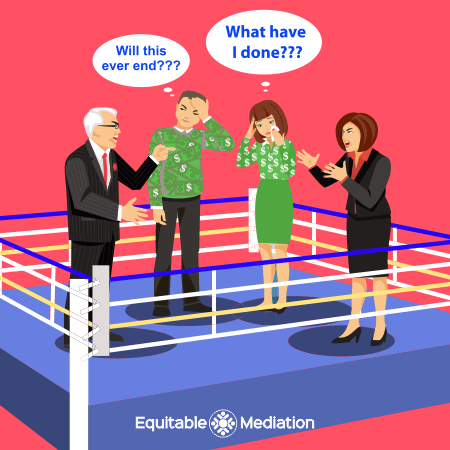Your marriage is ending and the same fears keep rushing through your head:
- The house: “Will I have enough money to keep it?”
- The bills: “How will I be able to pay them?”
- Health insurance: “Will I be able to get coverage?”
- Retirement: “Will there be any money left to save for the future?”
In divorce, all of these fears are normal and have something in common:
Money.
When it comes to money and divorce, there's one issue that's more emotional, controversial and challenging for spouses to resolve than any other.
Whether you call it alimony or divorce maintenance, coming to agreement on a matter that will require an ex-husband or wife to give money to the other ex-spouse to support their future lifestyle after the marriage is challenging, to say the least.
And the topic of alimony in Illinois is a complicated one.
* Note: For the purposes of this article, the terms alimony, maintenance, divorce maintenance and spousal support are used interchangeably.
Divorce Maintenance in Illinois: What’s the Purpose?
Alimony / Maintenance is one of four topics that are discussed and agreed upon in mediation along with:
Spousal maintenance is strictly based on need and is gender neutral. Meaning that both women and men can be eligible to receive payments.
The purpose of alimony is not to unfairly reward one spouse or punish the other. Instead, the idea is to allow the two ex-spouses to live somewhat similarly for a period of time after the marriage ends.
Maintenance is meant to assist the lower earning spouse as they transition from married to single life. Giving them some time to get back on their feet and become self-supporting after the dissolution of marriage.
There are a few things you need to understand about the challenges of determining spousal support Illinois:
- While state legislation offers practitioners a formula, in our extensive experience, more clients choose to deviate from the guideline, than follow it;
- While inflation has returned to more manageable levels, the cost-of-living remains stubbornly high and shows no signs of abating, which in turn, significantly impacts a couple's ability to afford their separate post-marital lifestyles - regardless of how much maintenance is being paid or received;
- The Tax Cuts and Jobs Act (TCJA) eliminated the deduction of alimony payments for payors, and recipients are no longer required to report payments as taxable income on their federal returns, but still may do so on their Illinois state returns, further complicating their post-divorce tax picture;
- While on the surface, it might appear as if this tax change benefits the recipient and hurts the payor, it actually negatively impacts both parties;
- This topic has more to do with money and negotiation and less to do with laws;
- There is more than meets the eye on this issue and this matter is too difficult (and emotionally charged) to try to resolve on your own.
That's why you’ll get the best outcome by mediating with us.

"Unfortunately, the Illinois Maintenance Guidelines along with the modified tax treatment of maintenance resulting from the Tax Cuts and Jobs Act have left Illinois couples even more confused about this complex and emotionally charged topic than ever before.
So instead of trying to figure it out on your own, or getting caught up in an endless loop with lawyers, mediate your divorce with me.
I’ll guide you through my proven, step-by-step process and help you and your spouse negotiate and come to an agreement on alimony that's realistic and fair to both of you."
- Divorce Mediator Joe Dillon
The Illinois Maintenance Calculator How it Works
One of the ways maintenance in Illinois may be determined is by using a guideline calculator.
Provided they meet the requirements to use it, the guideline can help Illinois couples avoid the endless battles often associated with the topic. And minimize potential differences in maintenance settlement amounts between similar couples.
Under the guideline formula a maintenance award would equal 33 1/3 percent of the payer’s net income minus 25 percent of the payee’s net income.
This amount cannot exceed 40 percent of the parties’ combined net income when added to the payee’s net income.
In addition to the amount, the formula provides Illinois couples a duration for how long maintenance should last and varies depending on how long the couple's marriage lasted.
For example, if the marriage lasted 5 years, maintenance payments would last one year and two months. But if the couple was married 20 years, it may last 20 years or be permanent.
And there are a wide variety of other permutations in-between.
The Illinois maintenance formula has created new problems.
Unfortunately, the alimony guideline calculator has significant limitations. And there are a number of instances in which the formula or its calculated amount simply cannot be used.
Such as:
- When the calculated result for spousal maintenance exceeds the 40% threshold;
- When a couple's income exceeds a certain income threshold;
- If the paying party receives a bonus which is based on a factor that can't be predicted such as with company performance;
- If the paying party has variable income the way a salesperson on commissions would;
- If the paying party has recently received a significant raise or promotion;
- If the paying party is compensated in a non-traditional way like receiving stocks or options.
In all of these cases, the formula simply won't work.
So you and your husband or wife will have no other choice but to negotiate this issue.
Which is very difficult to do, given the very nature of divorce.
There are also issues when it comes to how long alimony in Illinois will last.
Take for example a 5-year marriage. The alimony duration formula in Illinois states spousal maintenance would last one year, and two months.
Let's say you have 1-year-old twins and you and your spouse decided that you would stay home with the children.
While it's certainly possible for you to return to work immediately after your divorce, it may not be realistic. It might make more sense to seek employment once the kids are in school full-time which would be at least 4 years from now.
How would you support yourself after alimony ended but before you had gainful employment?
On the other end of the spectrum, let's say you've been married 25 years and are 60 years old. Per the formula, you'd have to pay maintenance until you're 85.
How would you be able to retire?
Even if you gave your ex-spouse 50% of all retirement assets, per the formula, you wouldn't be able to retire until you were 85 years old.
In both cases, the formula would be unusable because you'd still need to negotiate maintenance duration.
And just like determining an amount, duration is not so easy to agree on.
You can choose to avoid the maintenance calculator, even if you’re eligible to use it.
As you've just learned, there are a number of instances where depending on how much money a couple earns or how they're compensated, the formula is useless.
So if any of those situations are like yours, you'll need to come to an agreement without using it.
But even if you do meet the criteria to use the formula, you and your spouse may not be satisfied with the result.
You can simply choose not to follow its recommendation and negotiate instead.
When discussing Illinois alimony, don't forget about cost of living.
As if figuring out maintenance in Illinois wasn't already a complicated endeavor, we've got yet one more factor to add to the conversation. And that's the cost of living.
Say your marital home was in Lincoln Square, Chicago. And you're the one paying alimony. And your spouse decides to move the kids to Northbrook, post-divorce. Better schools, and all...
You might think that moving out of the city, and into the burbs, would represent significant savings.
Guess again!
Northbrook is actually 32.2% more expensive to live in than Chicago!
So, do you pay them based on what it cost to live in Lincoln Square? Or do you pay them based on what it will cost to live in Northbrook?
Good question...
There’s more than one type of IL maintenance.
When thinking of maintenance, most people think of the "check in the mail" approach, whereby one party would make alimony payments of a "regular amount" to the other party.
The same way an employee would receive a "regular" paycheck.
And while that’s the most common way to go, there are two other types of maintenance available to Illinois couples as you'll soon find out.
These types of maintenance may be used on their own or in combination with each other depending on the couple's unique situation.
In addition, some people feel very strongly against having to write a check monthly to their ex. So there are also other, more creative ways to resolve this highly contentious subject.
For example, divorcing couples will sometimes trade spousal support for equitable distribution. Or do an alimony buyout. Or pay alimony in one lump sum.
The point is there isn’t any such thing as "typical maintenance" payments.
And there are many different ways of settling this issue.
The three types of alimony in Illinois:
As you just learned, there are actually three different types of alimony Illinois couples can consider in their divorce.
And they are:
1. Permanent or Impermanent Maintenance
As the title suggests, Illinois allows for the payment of maintenance until one of the parties dies.
However, that doesn't mean that maintenance always continues until death in permanent maintenance cases. Illinois divorce maintenance is still subject to terminating events such as remarriage of the recipient party.
Illinois divorce maintenance agreements can also contain other terminating events to be defined at the time of agreement thus making ‘permanent’ maintenance impermanent.
For example, a caveat may be that permanent maintenance terminates upon the retirement of the spouse who is paying.
In our experience, individuals who receive permanent divorce maintenance awards are typically older, have been in long-term marriages, and/or limited earning capacity, perhaps due to limited formal education or staying home to raise children while their spouse furthered their career.
Illinois alimony agreements may also award permanent maintenance to individuals who have a medical condition that prevents them from being self-sufficient.
2. Maintenance in Gross
This is maintenance is paid in one lump sum at the time of divorce, or relatively close to it, perhaps in a limited number of installments.
While less common than other types of Illinois divorce maintenance, it can be sometimes used by certain individuals to, in effect, “pre-pay” their maintenance obligation in order to gain certain tax advantages.
An arrangement in which maintenance in gross is used appears quite a bit like a property settlement that one might see during equitable distribution.
When considering this type of divorce maintenance, one must be cautious of the discount rate used for present value calculations and be cognizant of the impact of terminating events, or lack thereof.
3. Rehabilitative Maintenance
The third type of divorce maintenance that Illinois allows for is rehabilitative maintenance, also known as “reviewable maintenance” or “periodic maintenance.”
This type of maintenance may be paid for a short, fixed period of time or an indefinite one with periodic review.
The idea of rehabilitative maintenance is to allow the recipient spouse some time to “get back on their feet” and enjoy on their own a similar post-marital lifestyle as the one enjoyed while married.
For those recipients of rehabilitative maintenance who have a college degree or the means by which to earn a comparable standard of living, the period of time for which it is offered is usually short and fixed.
The idea is to give the recipient spouse both time and an incentive to become self-sufficient. Once the period of time is satisfied, the maintenance is terminated.
In cases where it’s unclear whether the recipient spouse will be able to become self-sufficient in a finite period of time, rehabilitative maintenance (also known as “reviewable maintenance”) is usually awarded for an open-ended period of time.
In this case, the agreement would outline a review date and the parties would reconvene to determine if an extension of the maintenance is required. In limited cases, there are times when a fixed date is set and the burden to request an extension is placed upon the recipient.
It should be noted that the recipient party is required to make a good faith effort to become self-sufficient.
If it is determined they did not, maintenance may be terminated immediately.
There is more than meets the eye when it comes to Illinois alimony.
Since every couple’s situation is different, alimony is not a one-size-fits-all matter.
Coming to an agreement that’s fair requires more than a wild guess or passing conversation for spouses. And as you’re starting to see, there’s a lot involved in this highly complex topic.
Not only that but there are many places you can make expensive mistakes with far-reaching consequences.
The issue of divorce maintenance is much too complex and emotionally charged in most cases for you to attempt to determine on your own.
When you involve lawyers, it’s a problem.
 If you go the lawyer route, your divorce attorneys can drag out your negotiations for years.
If you go the lawyer route, your divorce attorneys can drag out your negotiations for years.
Fighting in circles. Around and around. In a gray area where no one’s right. All while billing you their ridiculous hourly fees.
That is, until neither you nor your husband or wife has any money left to keep paying your legal fees.
And there's no money left for divorce maintenance!
Just another reason it's better to avoid involving lawyers in your divorce negotiations.
When a judge gets involved, it’s a problem.
 If alimony can’t be successfully resolved between you, your spouse, and your respective attorneys, your case will continue to litigation in court.
If alimony can’t be successfully resolved between you, your spouse, and your respective attorneys, your case will continue to litigation in court.
But you need to understand something here: In a litigated divorce, a judge will decide how spousal support will be addressed.
Yikes!
That means the family law judge gets to dictate (on a case-by-case basis) the terms of your settlement in court and tell you what amount you’ll receive or have to pay.
And you might just wind up with an alimony outcome you don’t find fair or that doesn’t meet your needs.
That’s why it’s better to negotiate an amount and duration you and your husband or wife both find fair. And negotiation is the cornerstone of divorce mediation.
In mediation, you get to decide - and come to an agreement you both agree is fair, out of court - instead of letting your future be decided by a stranger.
You’ll get the best result by mediating your no-fault divorce with us.
 Using our extensive financial knowledge of the complex matters of alimony and maintenance, we'll discuss the different types of maintenance permitted in Illinois and help you both determine which type(s) may be applicable in your particular situation.
Using our extensive financial knowledge of the complex matters of alimony and maintenance, we'll discuss the different types of maintenance permitted in Illinois and help you both determine which type(s) may be applicable in your particular situation.
And explore the feasibility of using some combination of alimony types in conjunction with child support and equitable distribution, as all three topics are inter-connected.
We’ll actively guide you through our comprehensive budgeting process to reflect your marital expenses as well as your projected expenses post-divorce. So we can take a close look together at what each of you earns, spend, and will need to move forward.
And determine how, if at all, the division of your marital property and debts and expenses related to your children will factor in when determining an amount and duration.
We’ll then help you negotiate a maintenance result you both find fair and will best allow you to fulfill your financial obligations after you're divorced.
Equitable Mediation enables you to get a fair maintenance outcome.
 Why be forced to accept a settlement created by a family law attorney or judge when you can have a direct say in your financial future instead?
Why be forced to accept a settlement created by a family law attorney or judge when you can have a direct say in your financial future instead?
If you want to arrive at an agreement on maintenance that’s fair to each of you and doesn’t bankrupt you in the process, mediate your divorce with Equitable Mediation.
If you and your spouse have both agreed to divorce and want to mediate, take the next step and book an initial meeting for the two of you.
Other Useful Resources:




 If you go the lawyer route, your divorce attorneys can drag out your negotiations for years.
If you go the lawyer route, your divorce attorneys can drag out your negotiations for years. If alimony can’t be successfully resolved between you, your spouse, and your respective attorneys, your case will continue to litigation in court.
If alimony can’t be successfully resolved between you, your spouse, and your respective attorneys, your case will continue to litigation in court. Using our extensive financial knowledge of the complex matters of alimony and maintenance, we'll discuss the different types of maintenance permitted in Illinois and help you both determine which type(s) may be applicable in your particular situation.
Using our extensive financial knowledge of the complex matters of alimony and maintenance, we'll discuss the different types of maintenance permitted in Illinois and help you both determine which type(s) may be applicable in your particular situation. Why be forced to accept a settlement created by a family law attorney or judge when you can have a direct say in your financial future instead?
Why be forced to accept a settlement created by a family law attorney or judge when you can have a direct say in your financial future instead?